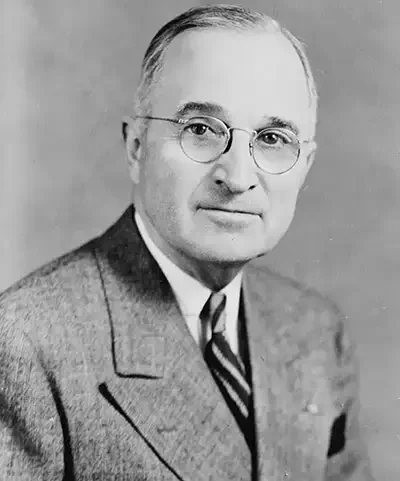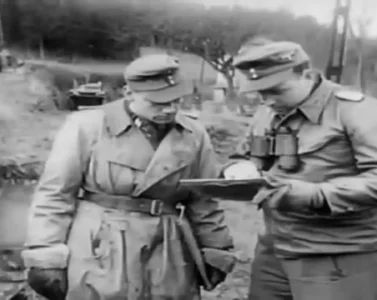- Military History
- Biographies
- Politicians Biographies
- President Harry S. Truman
President Harry S. Truman
Truman was president of the United States of America at a momentous time and did not shrink from exercising responsibility
Truman had served as vice president under Franklin D. Roosevelt for less than three months when Roosevelt's death thrust Truman into the White House. His administration would be rife with controversy, but the stalwart Missourian never backed away from the rigors of high office, and he assumed responsibility for all the decisions made by his administration. A small plaque on his desk confirmed Truman's conviction: "The buck stops here."
Truman was born on May 8, 1884, in Lamar, Missouri, the oldest child of John and Martha Truman. When he was six years old, his family moved to Independence, Missouri. It was there, while attending Sunday school at the local Presbyterian church, that Truman met five-year-old Bess Wallace, the girl who would later become his wife.
Political Beginnings
In need of a job, Truman turned to Mike Pendergast, organizer of the Democratic club Truman had belonged to years earlier, for permission to enter a four-way Democratic primary for an eastern Jackson County judgeship - a position that supervised county roads and buildings. Pendergast okayed Truman's entry but refused to endorse him. One of the other candidates was supported by the Ku Klux Klan, and they encouraged Truman to join the white supremacy group. He joined, but then changed his mind, and his entrance fee was returned. Truman campaigned on his war record and his deep Missouri roots, and he won both the primary and the general election. He was sworn into his first public office in January 1923.
Harry Truman's middle initial doesn't stand for any name. It was given to him upon his birth to honor both of his grandfathers.
Truman was one of three county judges and found that he had little authority to do what the judgeship was supposed to do: repair and maintain county roads and buildings. However, he reduced the agency's debt and got some road repairs accomplished. When Truman's term was up, he hoped for re-nomination in the Democratic primary, but the influential Ku Klux Klan had other ideas. Almost as quickly as he had entered politics, Truman was out. For the next two years, he sold automobile club memberships and dabbled in banking.
In 1926, Truman sought a four-year term as presiding judge of the county, a position that oversaw county roads, buildings, and taxes. Tom Pendergast, boss of the powerful Pendergast political machine, supported him. Truman won the position and immediately set about correcting the problems caused by years of graft and political cronyism. By making sure tax money went where it was supposed to go and that all employees did their jobs, Truman turned the county around. His hard work paid off with a second easily won a four-year term.
Joining the Senate
After his stint as a county judge, Pendergast asked Truman to run for the U.S. Senate. Truman campaigned vigorously, capitalizing on the popularity of Franklin Roosevelt's New Deal and beat his Republican opponent by a large margin. However, his stint in the Senate got off to a terrible start. Despite his true honesty, Truman's association with the Pendergast political machine tainted him, and some believed that he would be implicated in the government's investigation of the Pendergast organization. Truman salvaged his political career by impressing two important men: Vice President John Nance Garner and Arthur Vandenberg, the Republican senator from Michigan. With their help, Truman was named to two important Senate committees, where his political savvy was a valued asset. (The government investigation of the Pendergast political machine concluded with no evidence of wrongdoing by Truman).
Truman was challenged for his Senate seat in 1940 by two influential Missouri Democrats who had worked to bring down the Pendergast machine. He was the odd man out in the race, hampered by a lack of both money and big-name support. Still, he made his best effort, canvassing the state and talking to the people in terms they could understand. Despite his association with the Pendergast’s, which was mentioned often by his opponents, Truman won the general election. Upon his return to the Senate, he received a standing ovation from his colleagues, many of whom were startled by his victory.
As the United States geared up for war in 1941, Truman began investigating allegations of waste in the defense program. He toured the camps and defense plants and found conditions he called appalling. Upon his return to the Senate, he denounced the defense program and demanded a full investigation. His colleagues agreed and put him in charge of the investigating committee.
The Truman committee spent the next two years investigating the defense program and producing detailed reports confirming allegations of fraud and waste. With a budget of just $400,000, the committee saved the nation an estimated $15 billion. The committee's success also made Harry Truman a national figure, and leading Democrats started mentioning his name as a contender for the 1944 vice presidential spot under Roosevelt.
The Call for a Strong Vice President
Few people doubted Roosevelt would run for a fourth term in 1944, though Democratic leaders were increasingly troubled by his failing health. The need for a strong vice-presidential candidate became paramount, and several names were tossed around besides Truman's. At the Democratic convention, Truman was elected on the second ballot; together, he and Roosevelt won the elections.
Truman had been vice president for just eighty-two days when Roosevelt died in April 1945. He spent his first month meeting with Roosevelt's aides and advisers to get up to speed on the war effort and to ensure the continuation of Roosevelt's plans and programs. As the Allies pushed into Germany and victory in Europe seemed guaranteed, Truman insisted that unconditional surrender was Germany's only option. V-E Day (Victory in Europe Day) was announced on May 8, 1945: Truman's sixty-first birthday.
From July 17 to August 2, Truman attended the Potsdam Conference in Germany along with Joseph Stalin and Winston Churchill (with Clement Attlee succeeding Churchill as British prime minister during the conference). The men discussed how best to implement the decisions reached at the previous Yalta Conference regarding the reconstruction of Europe after the war. As presiding officer, Truman suggested the establishment of a council of foreign ministers to oversee peace negotiations, settlement of reparations claims, and war crimes trials. He also received Stalin's promise to enter the war against Japan, which had remained stubbornly belligerent despite Germany's surrender.
Truman, backed by the other Allied leaders, issued the Potsdam Declaration on July 26, calling for Japan's unconditional surrender and listing peace terms. Ten days earlier, the first successful atomic bomb had been detonated near Alamogordo, New Mexico. Using such a bomb, Truman's military advisers told him, could help prevent the loss of up to 500,000 American servicemen should the Allies be forced to invade the Japanese mainland. When Japan ignored the ultimatum set forth in the Potsdam Declaration, Truman allowed the use of the bomb, which was dropped on the city of Hiroshima on August 6. Two days later, Stalin sent troops into Manchuria and Korea, and a second atomic bomb was dropped on Nagasaki the day after that. Japan laid down arms on August 14 and officially surrendered on September 2.
Following the War
With the war over, Harry Truman turned his attention to converting the United States back to a nation at peace. However, many of his proposals received tremendous opposition from Congress, which felt he was trying to attain too much too soon. Controversy over his domestic policies followed Truman for much of the rest of his first term.
The end of World War II did not mean an end to international tension. The USSR, once America's ally, quickly became a feared enemy as it tried to take control of much of Eastern Europe. Truman vehemently opposed Stalin's actions, and both sides quickly broke wartime agreements. The ensuing hostility between the two world superpowers blossomed into the Cold War.
Truman was re-elected president in 1948, campaigning on a platform of civil rights and other social issues that only angered Southern Democrats. The race was exceptionally close, and most people thought Republican candidate Thomas Dewey would win. The Chicago Tribune, in its belief that Truman would lose, ran the headline "Dewey Defeats Truman" on the front page of its early edition on November 2. However, when the votes were finally tabulated, Truman had won by nearly 2 million votes.
After his second term, Truman retired to his home in Independence, Missouri. He remained active in national and regional politics, though his influence had waned, and loyally supported the Democratic presidential candidates in subsequent years. He wrote memoirs and other books, and toured colleges and universities, lecturing on the American government. Harry Truman died in 1972 and was buried on the grounds of the Truman Library in Independence.
President Harry S. Truman - Quick Facts
- 102nd Infantry Division (United States)
- 129th Field Artillery Regiment (United States)
- 35th Division (United States)
- 379th Field Artillery Regiment (United States)
- WWI (1914-1918)
- WWII (1939-1945)
- Pacific War (1941-1945)
- Cold War (1947-1991)
- Korean War (1950-1953)
- {{#owner}}
- {{#url}} {{#avatarSrc}}
{{name}} {{/url}} {{^url}} {{#avatar}} {{& avatar}} {{/avatar}} {{name}} {{/url}} - {{/owner}} {{#created}}
- {{created}} {{/created}}
























